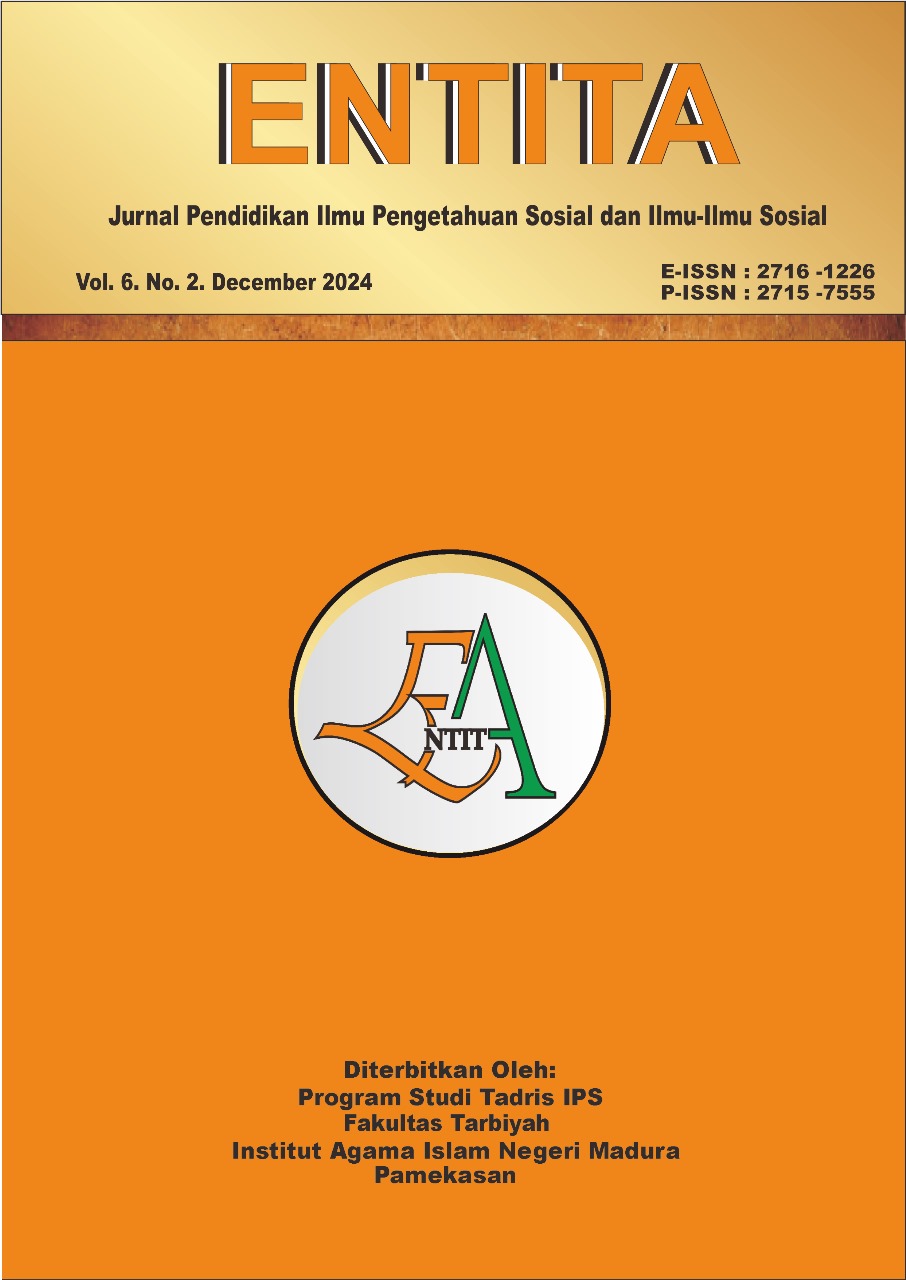Masyarakat Multikultural: Harmoni Antarumat Islam dan Kristen di Desa Prenggan, Sanggrahan, Grogol, Sukoharjo
 Abstract views: 182
,
Abstract views: 182
,
 PDF (Bahasa Indonesia) downloads: 142
PDF (Bahasa Indonesia) downloads: 142
Abstract
In multicultural societies, religious differences can often lead to conflicts, making it essential to foster haarmony among religious communities. This study aims to examine how harmonious relationships between Muslims and Cristian are established, , developed, maintained, and internalized by the community in Prenggan village, Sanggrahan, Grogol, Sukoharjo. The research employs a qualitative method observation and in-depth interviews, while secondary data were obtained from literature sources such as book, journals, and articles. The findings indicate that maintaning harmony between Muslim and Cristians requires active contributions from individuals, families, religious leaders, the government, and the broader community. Social harmony is not a spontaneous condition but the result of a deliberate and continous social contruction process. This success has created a peaceful environment marked by mutual respect despite religious differences whitin the community
Downloads
References
Alimuddin, A., Masmuddin, M., & P, E. (2023). Implementasi Moderasi Beragama dalam Menjaga Kerukunan di Desa Rinjani Luwu Timur. Jurnal Intelektualita: Keislaman, Sosial Dan Sains, 12(1), 35–52. https://doi.org/10.19109/intelektualita.v12i1.16458
Anwar, M. Z., Sunesti, Y., & Gusmian, I. (2021). Pro dan Kontra Pancasila: Pandangan Politik Anak Muda Muslim di Solo. Politika: Jurnal Ilmu Politik, 12(1), 107–127. https://doi.org/10.14710/politika.12.1.2021.107-127
Bahtiar, M. A. (2020). Penanaman Nilai-nilai Multikulturalisme melalui Lembaga Pendidikan Madrasah Diniyyah. Jurnal Kependidikan, 8(1), 42–58. https://doi.org/10.24090/jk.v8i1.3958
Berger, P. (1996). Identity as a Problem in the Sociology of Knowledge. Cambridge University Press.
Bintang, V., & Warsono, W. (2021). Praktik Multikulturalisme Antara Masyarakat Surabaya Dan Mahasiswa Papua Dalam Mewujudkan Harmonisasi Sosial. Kajian Moral Dan Kewarganegaraan, 10(2), 304–318. https://doi.org/10.26740/kmkn.v10n2.p304-318
Fibry Jati Nugroho. (2022). Potret Toleransi Kehidupan Masyrakat Dalam Perayaan Keberagamaan Di Tengah Perbedaan. Jurnal Sosial Humaniora Dan Pendidikan, 1(1), 37–42. https://doi.org/10.56127/jushpen.v1i1.61
Hadiwijaya, A. S. (2023). Sintesa Teori Konstruksi Sosial Realitas Dan Konstruksi Sosial Media Massa. DIALEKTIKA KOMUNIKA: Jurnal Kajian Komunikasi Dan Pembangunan Daerah, 11(1), 75–89. https://doi.org/10.33592/dk.v11i1.3498
Huberman, A. M., Miles, M. B., & Rohidi, T. R. (1992). Analisis data kualitatif: buku sumber tentang metode-metode baru. U.I Press.
Khoiruzzadi, M., & Dwi Tresnani, L. (2022). Harmonisasi Masyarakat Muslim Dan Kristen: Pola Interaksi Bermasyarakat Dukuh Purbo. Harmoni, 21(1), 130–150. https://doi.org/10.32488/harmoni.v21i1.599
Krismiyanto, A., & Kii, R. I. (2023). Membangun Harmoni dan Dialog Antar Agama dalam Masyarakat Multikultural. Jurnal Review Pendidikan Dan Pengajaran (JRPP), 6(3), 238–244. http://journal.universitaspahlawan.ac.id/index.php/jrpp/article/view/18822
Miharja, D., & Hernawan, W. (2017). Merawat Kerukunan di Desa Cikawungading, Kecamatan Cipatujah, Kabupaten Tasikmalaya, Jawa Barat. Religió: Jurnal Studi Agama-Agama, 7(2), 297–319. https://doi.org/10.15642/religio.v7i2.757
Musa, M. M. (2021). Peran Agama Dalam Perubahan Sosial Masyarakat. Nuansa, 14(2), 198–205. https://doi.org/10.29300/njsik.v14i2.5194
Nada, A. L. I., Arifin, A. S., Anggraini, T. M., & Sultoni, A. (2024). Program Kampung Tepa Salira Sebagai Upaya Penguatan Toleransi dan Moderasi Beragama Masyarakat Multikultural Kelurahan Tlogomas, Kota Malang. JURPIKAT (Jurnal Pengabdian Kepada Masyarakat), 5(1), 109–119. https://doi.org/10.37339/jurpikat.v5i1.1531
Napitupulu, M. (2022). Peran Kitab Keagamaan (Alkitab) Sebagai Upaya Membangun Toleransi dalam Konflik Umat Beragama di Indonesia. Jurnal Christian Humaniora, 6(1), 149–166. https://doi.org/10.46965/jch.v6i1.1522
Natalia, A. (2016). Faktor-faktor penyebab radikalisme dalam beragama. Al-Adyan, 11(1), 1–11. https://media.neliti.com/media/publications/177630-ID-faktor-faktor-penyebab-radikalisme-dalam.pdf
Retnowati, P. (2018). Agama, Konflik dan Integrasi Sosial Refleksi Kehidupan Beragama di Indonesia: Belajar dari Komunitas Situbondo Membangun Integrasi Pasca Konflik. SANGKéP: Jurnal Kajian Sosial Keagamaan, 1(1), 1–28. https://doi.org/10.20414/sangkep.v1i1.603
Rohmatika, R. V. (2018). Fanatisme Beragama. Al-Adyan, Volume 13, No. 1, Januari-Juni, 2018, 13(1), 1–22. https://doi.org/https://doi.org/10.24042/ajsla.v13i1.2940
Samuel, H. (2012). Peter Berger : Sebuah Pengantar Ringkas. Kepik.
Sugiyono. (2016). Memahami Penelitian Kualitatif. Alfabeta.
Sulaiman, A. (2016). Memahami Teori Konstruksi Sosial Peter L. Berger. Society, 4(1), 15–22. https://doi.org/10.33019/society.v4i1.32
Topan, A. (2024). Potret Kehidupan Umat Beragama (Studi Kasus Penolakan Wahabi-Salafi di Pamekasan Madura 2010—2023). Entita: Jurnal Pendidikan Ilmu Pengetahuan Sosial Dan Ilmu-Ilmu Sosial, 6(1), 67–86. https://doi.org/10.19105/ejpis.v6i1.12589
Copyright (c) 2024 Entita: Jurnal Pendidikan Ilmu Pengetahuan Sosial dan Ilmu-Ilmu Sosial

This work is licensed under a Creative Commons Attribution-NonCommercial 4.0 International License.
ENTITA: Jurnal Pendidikan Ilmu Pengetahuan Sosial dan Ilmu-Ilmu Sosial operates an Open Access policy under a Creative Commons Non-Commercial 4.0 International license. Authors who publish with this journal agree to the following terms:
- The copyright of the received article once accepted for publication shall be assigned to the journal as the publisher with licensed under a

- Journal is able to enter into separate, additional contractual arrangements for the non-exclusive distribution of the journal's published version of the work (e.g., post it to an institutional repository or publish it in a book), with an acknowledgement of its initial publication in this journal.
- Journal is permitted and encouraged to post their work online (e.g., in institutional repositories or on their website) prior to and during the submission process, as it can lead to productive exchanges, as well as earlier and greater citation of published work (see The Effect of Open Access).
- Here is Copyright Transfer Form that author can download and send to OJS during submission.

















